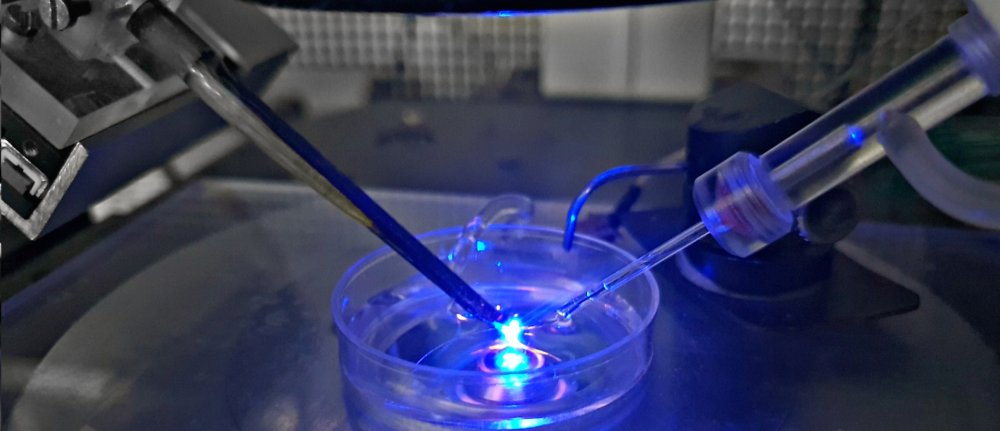Research of the Laboratory of Cellular Neurophysiology focuses on the function and pharmacology of ionotropic receptors (ligand-activated ion channels), specifically ionotropic glutamate receptors (iGluRs) and transient receptor potential (TRP) channels. iGluRs mediate the majority of excitatory signaling in the central nervous system, are essential for normal brain development and function, and their dysfunction leads to serious neurological and psychiatric disorders, including many forms of neurodegeneration. TRP channels are present in both the peripheral and the central nervous system, and they play a fundamental role in the detection and transmission of painful stimuli and participate in signaling associated with chronic inflammation.
The goal of our research is to better characterize the relationship between ionotropic receptor structure and function, to identify molecular mechanisms of ionotropic receptor modulation by different chemical compounds or physical variables, and to describe the consequences of mutations of human ionotropic receptors for the function of synapses, neurons and neuronal networks. Obtained results deepen our basic understanding of the mechanisms of ionotropic receptor function, and inform the development of novel receptor modulators with therapeutic potential in the treatment of neurodevelopmental and neurodegenerative disorders.
History of the Laboratory History of the Laboratory II
Methods
Alumni List
Projects
Glutamate is the primary excitatory neurotransmitter in the central nervous system. NMDA receptors (NMDARs) are ionotropic glutamate receptors that detect glutamate in the context of ongoing circuit activity. NMDAR activation requires the binding of glutamate as an agonist and glycine as a co-agonist, together with sufficient membrane depolarization to relieve the voltage-dependent channel block by extracellular Mg2+. In addition, NMDAR function is tightly regulated by a number of endogenous modulators. Upon activation, the NMDAR forms a cation channel highly permeable to Ca2+, a second messenger that coordinates downstream signalling leading to activity-dependent changes in synaptic strength. NMDARs are therefore critical for the development of neural circuits and for their ability to process information.
More
We investigate molecular mechanisms of nociception and thermosensation by focusing on thermosensitive transient receptor potential (TRP) ion channels. These channels are specifically expressed in primary nociceptive neurons and work in concert to detect potentially damaging stimuli and transduce them into pain signalling.
The goal of our research is to understand the physiological or pathophysiological significance of specific subclasses of TRP ion channels involved in the detection of noxious thermal, mechanical and chemical stimuli, through deciphering molecular and biophysical principles of their operational features.
We use electrophysiological and microfluorometric techniques, mainly patch-clamp recording at whole-cell and single-channel levels. For a more detailed understanding of TRP ion channel activation mechanisms we also use biochemistry and molecular biology combined with molecular modelling.
More
Publications
Kolcheva; Marharyta - Ladislav; M. - Netolický; J. - Kortus; Š. - Řeháková; K. - Hrčka Krausová; B. - Hemelíková; K. - Misiachna; A. - Kádková; A. - Klíma; Martin - Chalupská; Dominika - Horák; M.
The pathogenic N650K variant in the GluN1 subunit regulates the trafficking; conductance; and pharmacological properties of NMDA receptors
.
Neuropharmacology. 2023; 222(1 January)); 109297
.
IF = 4.7
[ASEP]
[
doi
]
Abramová; Vera - Alvarado; Vanessa Leal - Hill; M. - Smejkalová; Tereza - Malý; Michal - Valeš; Karel - Dittert; Ivan - Božíková; Paulina - Kysilov; Bohdan - Hrčka Krausová; Barbora - Vyklický; Vojtěch - Balík; Aleš - Fili; Klevinda - Kořínek; Miloslav - Chodounská; Hana - Kudová; Eva - Číž; D. - Martinovič; J. - Bartůněk; Petr - Vyklický ml.; Ladislav
.
Effects of Pregnanolone Glutamate and Its Metabolites on GABAA and NMDA Receptors and Zebrafish Behavior
.
ACS Chemical Neuroscience. 2023; 14(10); 1870-1883
.
IF = 5.0
[ASEP]
[
doi
]
Zímová; Lucie - Ptáková; Alexandra - Mitro; Michal - Krůšek; Jan - Vlachová; Viktorie
.
Activity dependent inhibition of TRPC1/4/5 channels by duloxetine involves voltage sensor-like domain
.
Biomedicine & Pharmacotherapy. 2022; 152(August)); 113262
.
IF = 7.5
[ASEP]
[
doi
]
Zhang; L. - Simonsen; Ch. - Zímová; Lucie - Wang; K. - Moparthi; L. - Gaudet; R. - Ekoff; M. - Nilsson; G. - Hellmich; U. A. - Vlachová; Viktorie - Gourdon; P. - Zygmunt; P. M.
Cannabinoid non-cannabidiol site modulation of TRPV2 structure and function
.
Nature Communications. 2022; 13(1)); 7483
.
IF = 16.6
[ASEP]
[
doi
]
Štefková-Mazochová; K. - Danda; H. - Dehaen; W. - Jurásek; B. - Šíchová; K. - Pinterová-Leca; N. - Mazoch; V. - Hrčka Krausová; Barbora - Kysilov; Bohdan - Smejkalová; Tereza - Vyklický ml.; Ladislav - Kohout; M. - Hájková; K. - Svozil; Daniel - Horsley; R. R. - Kuchař; M. - Páleníček; T.
Pharmacokinetic; pharmacodynamic; and behavioural studies of deschloroketamine in Wistar rats
.
British Journal of Pharmacology. 2022; 179(1); 65-83
.
IF = 7.3
[ASEP]
[
doi
]
Show more

